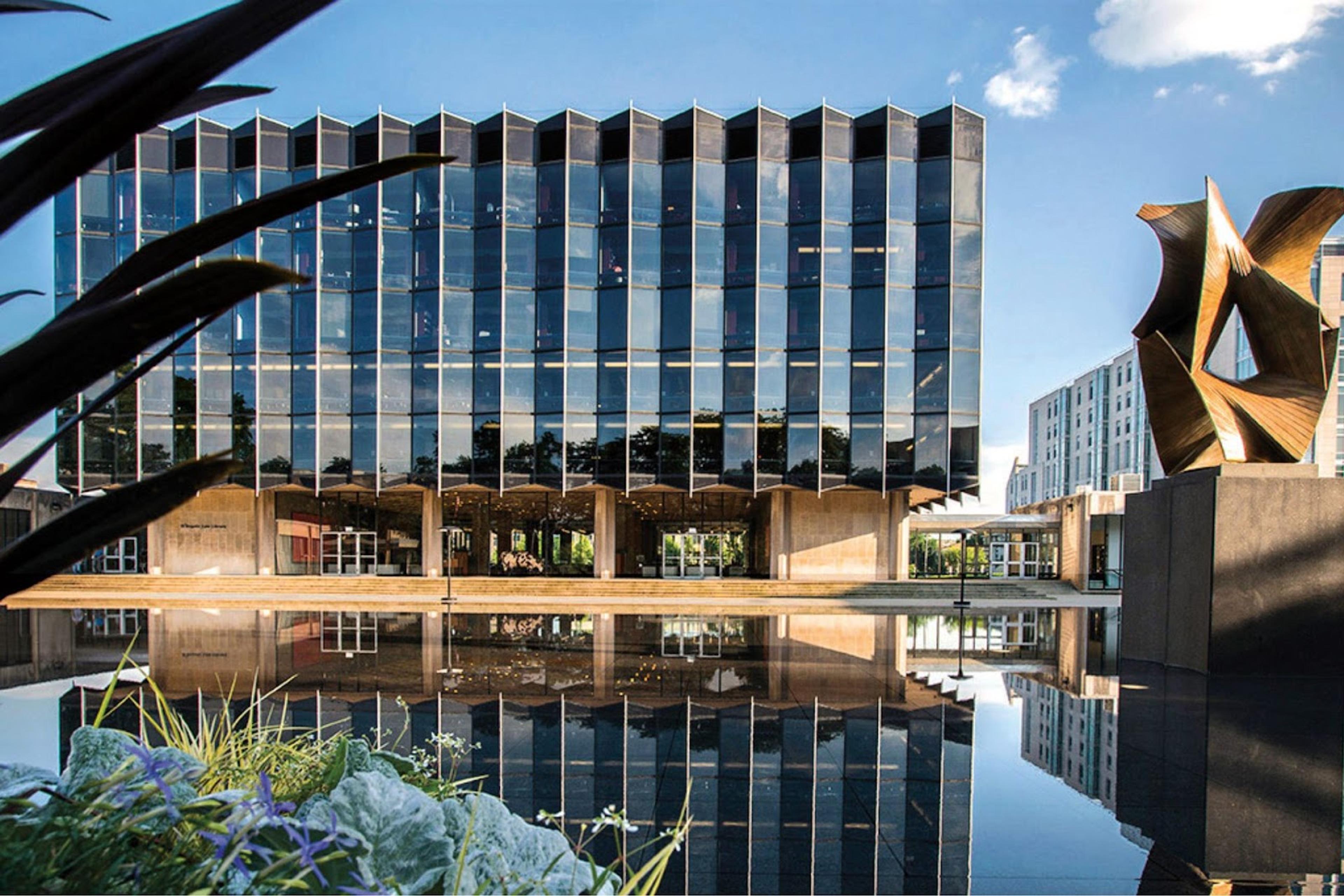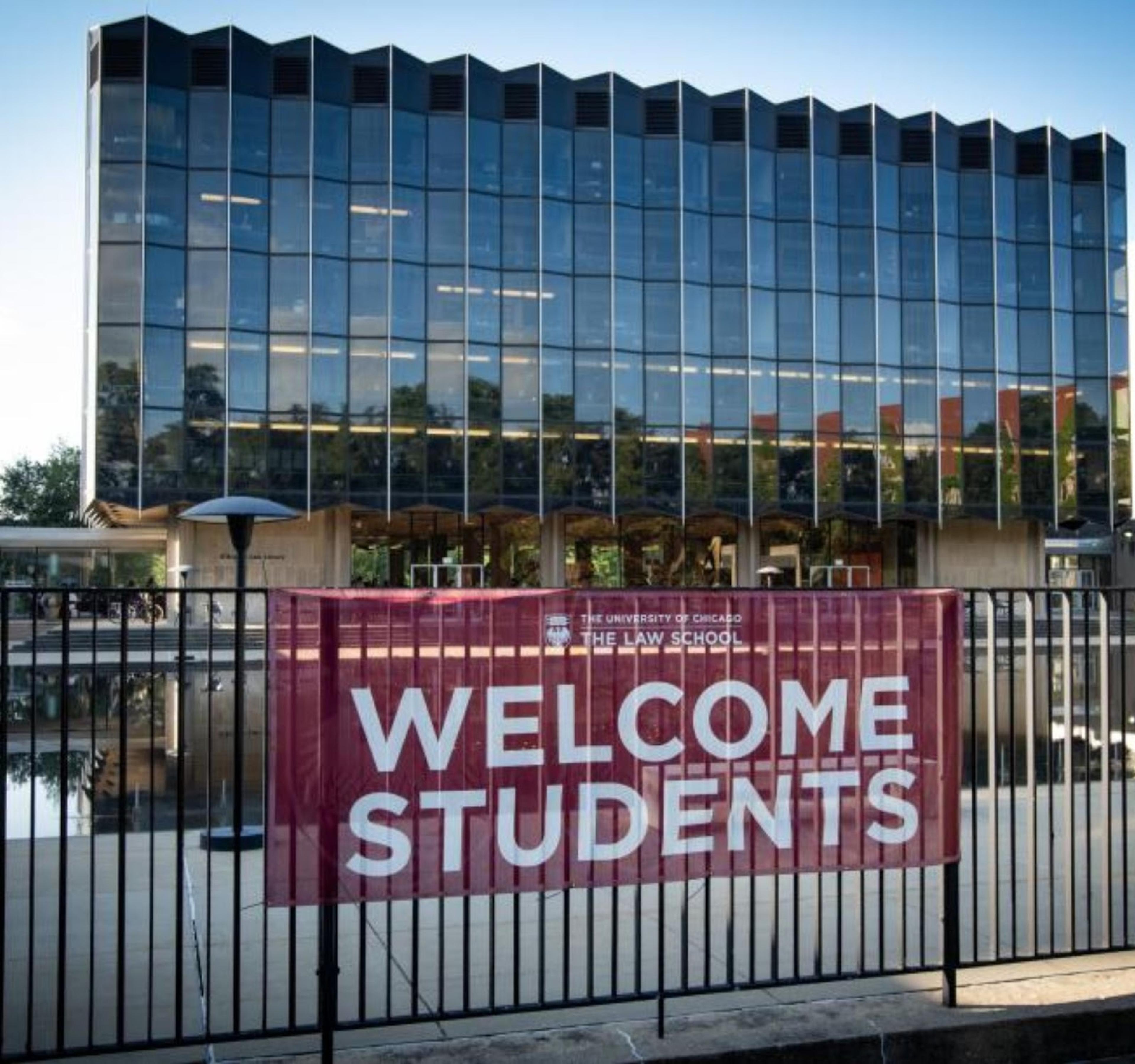How to Get Into the University of Chicago Law School (2026)
Discover everything there is to know about the University of Chicago Law School's program and application process.
Posted January 6, 2026

Join a free event
Learn from top coaches and industry experts in live, interactive sessions you can join for free.
Table of Contents
How Hard is It to Get Into the University of Chicago Law School?
The University of Chicago Law School ranks #3 among the top law schools in the United States. With a national reputation for academic rigor and cutting-edge research, it maintains a highly selective admissions process. The acceptance rate for recent classes averages around 12.7%, reflecting the school’s emphasis on admitting academically exceptional and intellectually curious students.
Acceptance Rate Over Time
| Class of 2027 | Class of 2026 | Class of 2025 | Class of 2024 | Class of 2023 | Class of 2022 | |
|---|---|---|---|---|---|---|
| Applications Received | 5,320 | 5,610 | 5,366 | 6,514 | 5,246 | 4,971 |
| Offers of Admission | 675 | 702 | 683 | 776 | 747 | 888 |
| Enrolled 1Ls | 198 | 192 | 191 | 175 | 190 | 203 |
| Acceptance Rate | 12.69% | 12.51% | 12.73% | 11.91% | 14.24% | 17.86% |
| Yield | 29.33% | 27.35% | 27.96% | 22.55% | 25.42% | 22.86% |
Note: Figures can fluctuate annually due to various factors, including the number of applications received and changes in admission policies. For the most accurate and up-to-date information, it's advisable to consult the official University of Chicago Law School admissions website or contact their admissions office directly.
Programs Offered by the University of Chicago Law School
The University of Chicago Law School offers a variety of programs designed to provide a comprehensive and rigorous legal education:
- Juris Doctor (JD) - A three-year program emphasizing foundational courses such as constitutional law, criminal law, and civil procedure, combined with extensive opportunities for experiential learning.
- Joint Degree Programs - Options include JD/MBA (with the Chicago Booth School of Business) and JD/PhD, allowing students to combine legal studies with other fields.
- Master of Laws (LL.M.) - This one-year graduate program is designed for both domestic and international lawyers seeking advanced legal knowledge in areas such as international law and commercial law.
- Clinical Programs - These include the Mandel Legal Aid Clinic and specialized clinics focusing on appellate advocacy, environmental law, and public interest issues.
- Loan Repayment Assistance Program - The school offers a robust loan repayment assistance program (LRAP) to support graduates pursuing careers in public interest or other low-income legal fields, helping to reduce the financial burden of student loans.
- Supreme Court Advocacy - The law school emphasizes preparing students for careers that may lead to roles in the Supreme Court, whether through clerkships, litigation, or constitutional law practice.
- Specialized Centers and Reviews - Students can participate in the Chicago Business Law Review and other journals that enhance their expertise and legal knowledge in specific areas of law.

Admissions Requirements — Who Gets Into the University of Chicago Law School?
Applicants to the University of Chicago Law School are evaluated holistically. Key considerations include academic records, LSAT or GRE scores, personal statements, resumes, and letters of recommendation. The school seeks a diverse student body, valuing applicants who demonstrate intellectual curiosity, leadership, and a commitment to justice.
- Undergraduate transcripts showing a strong GPA
- LSAT or GRE scores (LSAT preferred if both are submitted)
- A well-crafted personal statement
- 2-4 letters of recommendation from professors or employers
- A detailed resume highlighting leadership and relevant experiences
- Optional essays such as "Why Chicago Law?"
University of Chicago Law Admissions Stats: LSAT, GPA, & Class Profile
- Women: ~48%
- Students of Color: ~43% (estimated)
- LGBTQ+: ~10% (estimated)
- International Students: ~8% (estimated)
- STEM Majors: >25%
- Average Age: ~25 (estimated)
- Class Size: 198 students
| 25th Percentile | 50th Percentile (Median) | 75th Percentile | |
|---|---|---|---|
| GPA | 3.83 | 3.94 | 3.99 |
| LSAT | 169 | 173 | 175 |
What LSAT Score Do You Need for the University of Chicago Law School?
- 25th Percentile: 169
- 50th Percentile (Median): 173
- 75th Percentile: 175
Competitive applicants should aim for an LSAT score of 172 or higher. Applicants with lower scores should focus on strengthening other aspects of their application.
Bonus: How to Get Into UChicago Law With a Low LSAT Score
- Demonstrate leadership in professional or academic settings.
- Secure strong letters of recommendation that highlight your unique strengths.
- Address LSAT weaknesses through an addendum that explains extenuating circumstances.
Read: Top 30+ Free Resources for the LSAT
What GPA Do You Need for the University of Chicago Law School?
To be competitive at the University of Chicago Law School, applicants typically need a high undergraduate GPA. Below are the most recent statistics for admitted students:
- 25th Percentile: 3.83
- 50th Percentile (Median): 3.94
- 75th Percentile: 3.99
A strong GPA demonstrates academic excellence and the ability to handle the rigorous coursework at UChicago Law. Most successful applicants achieve near-perfect grades in challenging coursework, often from highly regarded undergraduate institutions. However, applicants with GPAs below the median may still have a chance for admission if they can showcase other compelling strengths, such as a high LSAT score, exceptional professional experiences, or a unique personal background.
Bonus: How to Get Into the University of Chicago Law School with a Low GPA
Applicants with GPAs below the competitive range can improve their chances with the following strategies:
- Scoring significantly above the median LSAT (172) demonstrates your academic potential and can offset concerns about your GPA.
- Use your essay to provide context for your GPA, such as challenges overcome or an upward academic trend, while emphasizing your motivation for studying law and aligning with UChicago’s values.
- Highlight impactful roles in legal settings, public interest, or leadership positions to show how your practical skills and experiences make you a strong candidate.

How to Apply to the University of Chicago Law School
University of Chicago Law School Application Deadlines (2026)
- Early Decision (ED) & Chicago Law Scholars Program: Submit via LSAC by December 1, 2026. Decisions for ED typically come in late December.
- Regular Decision: Applications must be complete by March 1, 2027. LSAC begins sending files on September 1, 2026, and admissions decisions are issued on a rolling basis after your file is complete.
- After March 1: UChicago may continue reviewing exceptional applications on a limited basis. Keep in mind that late decisions may affect scholarship eligibility.
Financial Aid
The University of Chicago Law School offers generous financial aid packages, including merit-based scholarships and need-based grants, to help students manage the cost of attendance. Prospective students are encouraged to complete the FAFSA and institutional forms to maximize their eligibility. Many scholarships are awarded based on academic achievement, leadership potential, and contributions to diversity. Additionally, the Loan Repayment Assistance Program (LRAP) is available to graduates pursuing careers in the public interest, making it more feasible to follow less financially lucrative career paths.
Living Expenses and Cost of Attendance
The total cost of attending the University of Chicago Law School includes tuition, fees, and living expenses, which can vary depending on lifestyle and housing choices. Students in Chicago can expect to spend approximately $25,000 annually on housing, food, transportation, and other necessities. The school provides estimates to help students budget effectively and offers advice on finding affordable housing near campus. For additional support, financial aid packages often account for living expenses, ensuring students can focus on their studies without undue financial stress.
Eligibility
To be eligible for admission to the University of Chicago Law School, applicants must hold a bachelor’s degree from an accredited institution by the time of enrollment. A valid LSAT or GRE score is required as part of the application. While both test scores are accepted, the LSAT is preferred if both are submitted.
International applicants must demonstrate proficiency in English through the TOEFL or IELTS unless they have completed their undergraduate degree in an English-speaking institution. Additionally, international credentials must be evaluated for U.S. equivalency through a recognized evaluation service, such as World Education Services (WES). Applicants with unique educational or professional backgrounds are encouraged to highlight their global perspectives and contributions to diversity in their application materials.
Personal Statement
The personal statement is a pivotal component of the application to the University of Chicago Law School, providing applicants with the opportunity to convey their unique voices and experiences. It should articulate the candidate's motivations for pursuing a legal career, career aspirations, and reasons for choosing UChicago Law.
A successful personal statement will demonstrate a clear connection between the applicant’s personal journey and the values and mission of the law school. For instance, applicants may reference UChicago’s renowned programs, such as its Justice Clinic or Supreme Court Advocacy, as they relate to their goals. The essay should be concise, well-organized, and free of grammatical errors, typically not exceeding two double-spaced pages. By presenting a compelling narrative, applicants can leave a lasting impression on the admissions committee.
Letters of Recommendation
Strong letters of recommendation are a critical component of your application. UChicago Law requires 2-4 letters, ideally from professors or employers familiar with your academic and professional abilities. Recommenders should provide specific examples of your achievements, intellectual capacity, and readiness for the rigors of law school.
Pro Tip: Provide recommenders with a copy of your resume and personal statement to help them craft detailed and personalized letters.
Read: How Many Letters of Recommendation for Law School: A Comprehensive Guide
Law School Resume
Your law school resume is a critical component of your application, offering a concise yet impactful overview of your academic, professional, and extracurricular achievements. It should be structured clearly and tailored to showcase experiences and skills that align with the expectations of competitive law schools like the University of Chicago Law School.
Here’s how to craft an effective law school resume:
- Start with your academic background, listing degrees in reverse chronological order. Include your GPA (if competitive) and notable achievements like honors, scholarships, or relevant coursework.
- Highlight roles that demonstrate leadership, critical thinking, problem-solving, or advocacy skills. For example, internships at law firms, research assistantships, or roles in public service are particularly relevant.
- Emphasize leadership positions in organizations, student government, or community service projects that showcase your ability to manage responsibilities and work collaboratively.
- Include language proficiencies, technical skills, or certifications (e.g., legal research tools like LexisNexis or Westlaw) that enhance your qualifications.
- Use a clean, professional layout with consistent formatting. Bullet points should be concise, action-oriented, and focused on measurable achievements (e.g., “Managed a team of five to complete a legal research project on constitutional law”).
Pro Tip: Collaborate with a top law school admissions coach to refine your resume and align it with the expectations of top-ranked schools like UChicago Law.
Different Types of Applicants — Requirements for the University of Chicago Law School
The University of Chicago Law School values diversity in its student body and encourages applicants from various backgrounds and experiences to apply. Below are the specific considerations for different types of applicants:
Reapplicants
Reapplicants to UChicago Law should focus on demonstrating growth and improvement since their previous application. This could include achieving a higher LSAT or GRE score, gaining significant work experience, or enhancing academic performance through additional coursework. The personal statement or an addendum can be used to reflect on previous shortcomings and provide context for how the applicant has strengthened their candidacy.
Transfer Students
Transfer applicants must currently be enrolled in an ABA-accredited law school and typically need to rank in the top 10% of their class to be competitive. A strong academic record, a letter of good standing from their current institution, and first-year law school transcripts are required. Transfer students should also submit a personal statement that highlights their reasons for transferring to UChicago Law, such as its unique clinical programs or focus on public interest.
Military Veterans
The University of Chicago Law School encourages applications from veterans, recognizing the valuable skills they bring, such as leadership, discipline, and the ability to work under pressure. Veterans are encouraged to emphasize their service experiences, particularly those demonstrating problem-solving, teamwork, and a commitment to public service. The law school also provides dedicated resources to support veterans as they transition to academic life.
International Students
International applicants must meet additional requirements, including proof of English proficiency through the TOEFL or IELTS, unless their undergraduate degree was earned in English. Transcripts from international institutions must be evaluated for U.S. equivalency by a recognized credential evaluation service. International students are encouraged to highlight how their unique perspectives and experiences will contribute to the law school’s diverse and globally-minded community.
5 Expert Tips on How to Get Into the University of Chicago Law School
- Tailor your application - Research and emphasize specific programs or opportunities at UChicago Law that align with your career goals. For example, highlight your interest in the Mandel Legal Aid Clinic, the Appellate Clinic, or joint degree programs like the JD/MBA. Mention how these offerings uniquely prepare you for your desired legal path.
- Excel on the LSAT or GRE - A competitive test score is essential for standing out in UChicago Law’s highly selective admissions process. Set a target score that meets or exceeds the school’s median (172 for LSAT, or equivalent GRE scores). Invest in quality prep materials or consider a tutor to strengthen weaker areas.
- Showcase leadership - Highlight leadership roles and impactful experiences in your resume and essays. Whether you’ve led a team at a law firm, spearheaded initiatives in a public interest organization, or held academic leadership positions, focus on how these experiences demonstrate your ability to excel in a rigorous legal environment.
- Demonstrate intellectual curiosity - Use your personal statement and optional essays to connect your background to UChicago’s intellectual culture. For example, discuss how your interest in constitutional law, Supreme Court advocacy, or academic research aligns with the school’s emphasis on analytical rigor.
- Network with alumni - Reach out to UChicago Law alumni to gain insights into their experiences and advice. Mention meaningful conversations or shared values in your essays to show genuine interest and effort. This demonstrates that you’ve engaged with the school’s community and understand its unique offerings.
The Bottom Line
- UChicago Law is a top-ranked law school with a rigorous and competitive admissions process.
- Strong LSAT and GPA scores are critical, but the admissions committee values holistic reviews.
- Programs like the JD program and clinics provide exceptional training opportunities.
- Tailor your application to align with UChicago Law’s unique programs and values.
Pro Tip: Work with a top law school admissions coach to refine your application and maximize your chances of success. You can also join one of Leland’s law school application bootcamp or free law school events, where top admissions coaches break down real questions, common mistakes, and what it takes to stand out.
See: The 10 Best Law School Coaches: Who to Hire and Why
Read these next:
- How to Get Into UCLA Law
- Columbia Law School Vs. New York University School of Law: An In-Depth Comparison
- How to Get Into FSU Law School
- How to Get Into UC Irvine Law
- How to Get Into UC Davis Law School
FAQs
Does the University of Chicago Law School offer part-time or evening programs?
- No, the JD program is a full-time, three-year course of study.
What is the Law School's approach to teaching?
- The University of Chicago Law School employs the Socratic Method, encouraging a dialogue between professors and students to develop critical thinking skills.
Where is the Law School located?
- The Law School is situated on the main University of Chicago campus in Hyde Park, approximately seven miles south of downtown Chicago along Lake Michigan.
Does the Law School require work experience prior to admission?
- While not mandatory, approximately 70% of incoming students have at least one or two years of work experience.
What is the size of the entering JD class?
- Each year, about 200 students enroll in the entering JD class, contributing to a total JD student body of approximately 600.
Browse hundreds of expert coaches
Leland coaches have helped thousands of people achieve their goals. A dedicated mentor can make all the difference.


















